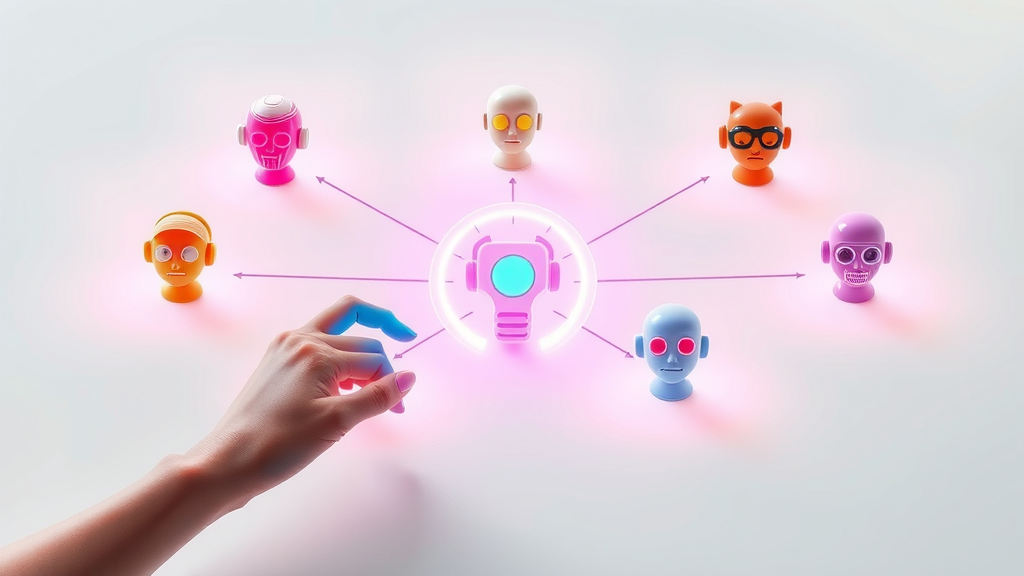Did you know 90% of thriving local businesses now use machine learning agents for smarter targeting and efficiency? This surprising reality is changing the game for companies of all sizes. If you want your business to stand out in your neighbourhood, it’s time to pull back the curtain on the tech transforming local marketing. In this guide, you’ll discover exactly how machine learning agents can give you the competitive edge you’ve been searching for—no technical degree required.
Unlocking the Power of Machine Learning Agents in Local Marketing
Local businesses face a unique set of challenges: attracting the right customers, stretching marketing budgets, and adapting to trends without massive resources. Machine learning agents are the secret sauce making these tasks easier and more effective. By harnessing the power of ai agents and intelligent agents tailored to marketing, you can automate repetitive tasks, target local audiences with pinpoint accuracy, and react to real-time data faster than ever before.
Instead of guessing what your customers want or relying solely on instincts, learning agents help you make decisions based on hard evidence: data. They process countless pieces of market information—from social media interactions to buying patterns—finding trends that might otherwise go unnoticed. The result? Campaigns that are more relevant, messages that resonate, and budgets that work harder for your bottom line. Think of machine learning agents as your virtual marketing team, always learning and improving to grow your local reach.

‘Did you know 90% of thriving local businesses now use machine learning agents for smarter targeting and efficiency?’
What You'll Learn About Machine Learning Agents
- How machine learning agents are transforming local business marketing
- Core concepts, types, and comparisons among ai agents, learning agent, intelligent agent
- Strategic steps for leveraging machine learning agents
- Real-world insights, benefits, and best practices
Understanding Machine Learning Agents: A Comprehensive Overview
Defining Machine Learning Agents and AI Agent Concepts
Machine learning agents are digital helpers that learn from data to make decisions or perform tasks without direct instructions. At their core, they’re a special type of ai agent—software systems designed to act intelligently in a given environment. These agents analyse patterns in your business data, customer behaviour, and market trends. Over time, their learning algorithms allow them to get better at tasks like targeting ads, segmenting customer lists, or predicting which offers will convert leads into loyal customers. Unlike static software, a learning agent grows more effective the more you use it, making it an indispensable asset for modern local marketing.
In the world of artificial intelligence (AI), intelligent agents can sense their environment (like your website or shop), process the information, and take action—sometimes in ways that surprise even seasoned marketers. For example, an ai agent may suggest adjusting your Google Ads spend during peak local shopping times or recommend specific social content to attract nearby foot traffic. Understanding this principle is key: learning agents thrive on data and feedback, evolving their strategies to help you get better results faster than manual guesswork ever could.

How Do Machine Learning Agents Differ From Traditional Intelligent Agents?
Traditional intelligent agents follow pre-set rules and can only handle straightforward situations. If the circumstances change, they may not adapt unless someone manually updates those rules. In contrast, machine learning agents use data and reinforcement learning to discover new strategies, adapt to new challenges, and even improve over time. A classic reflex agent may simply respond to a “yes or no” situation, but a learning agent goes further, using experience to develop new solutions.
This difference matters in local marketing. For example, a basic ai agent may push out a coupon every Friday, but a machine learning agent will analyse customer responses and shift promos to the days that earn the most engagement. The shift from fixed rules (simple reflex agent) to adaptive capabilities (learning agent) is what makes machine learning the gold standard for businesses aiming to keep pace with dynamic marketplaces and evolving customer needs.
The Role of Machine Learning Agents in Local Business Marketing
Case Studies: AI Agents Driving Real-World Marketing Results
Imagine a small bakery struggling to attract lunchtime crowds competing with a new café down the street. By using machine learning agents, the bakery analyses foot traffic patterns, reviews social media check-ins, and discovers that their biggest opportunity is actually on weekday afternoons. Their ai tools automate targeted promos to nearby office workers right before break time, boosting sales without wasting budget on less effective hours—a classic use case of ai agents turning local data into real results.
In another example, a neighbourhood retailer leverages intelligent agents to segment customer data. The learning algorithms spot which product combinations are popular and when, helping staff promote the right items at the right time. By continuously learning from training data, these agents create a cycle of improvement: better offers, happier customers, and measurable ROI. These stories highlight how machine learning agents bring big business strategies to local shops—empowering owners to punch above their weight in today’s fast-paced market.

Strategic Uses of Learning Agents for Small and Medium Enterprises
For small businesses, adopting machine learning agents starts with identifying the most valuable repetitive marketing challenges. Think of customer segmentation, campaign personalization, or responding quickly to local search trends—areas where ai agent systems shine. By integrating with affordable ai tool platforms, owners automate these tasks, freeing up time for more creative efforts or direct customer engagement. This isn’t science fiction but practical strategy, already deployed by local gyms, salons, and corner shops worldwide.
Another strategic step is using learning agents for budget optimization. The agent monitors ad performance and automatically adjusts spending to maximize ROI. Instead of letting money drip away on broad or outdated ads, the machine learning agent pinpoints which audiences are converting, when, and why. This approach reduces waste and helps every pound of your marketing budget go further. No matter your size or expertise, leveraging ai system technologies can level the playing field and open new channels for growth.
People Also Ask: What are Machine Learning Agents?
What Are Machine Learning Agents? Explained
Machine learning agents are smart computer systems that learn from data and experience. They use what they learn to make decisions and take actions, especially in areas like local marketing. For example, a learning agent might observe which social media posts get the most attention in your area, then suggest new ideas or automatically boost the ones that work best. These intelligent helpers get better over time as they see more data, helping local business owners work smarter, not harder.
Answer: Machine learning agents are intelligent agents that learn from data and experience to make decisions and take actions, especially within local marketing systems.

People Also Ask: What are the 5 Types of Agents in AI?
The Five Types of AI Agents: A Quick Guide
AI agents come in many flavours, but experts broadly define five classic types in the field of artificial intelligence:
- Simple Reflex Agent: Acts only on the current situation; no memory or learning.
- Model-Based Reflex Agent: Considers the world’s state using memory; can react to more complex situations.
- Goal-Based Agent: Chooses actions based on a set objective (like increasing sales).
- Utility-Based Agent: Selects actions based on expected outcomes (maximizing customer satisfaction or profit).
- Learning Agent: Continuously improves through experience and feedback from its environment, refining performance with every interaction.
All these agent types can be enhanced further by machine learning, which enables even smarter and more adaptive decision-making for local businesses of every kind.
Answer: Five classic AI agent types include: simple reflex agent, model-based reflex agent, goal-based agent, utility-based agent, and learning agent, all of which can be enhanced by machine learning.
People Also Ask: What are the 7 Types of AI Agents?
Exploring the Seven Types of AI Agents
Building on the basic types, some frameworks describe seven types of AI agents to cover a wider range of intelligence:
- Simple Reflex Agents: Immediate response, no memory.
- Model-Based Reflex Agents: React using an internal model.
- Goal-Based Agents: Take actions to achieve specific goals.
- Utility-Based Agents: Weigh outcomes to choose the most beneficial action.
- Learning Agents: Adapt and improve continuously.
- Intelligent Agents: Exhibit reasoning and flexible decision-making.
- AI System Agents: Complex entities that may combine multiple agent types for advanced functions.
This expanded list better reflects the diverse capabilities of modern ai agents and underscores why machine learning agents are leading the way in business innovation.

Answer: The seven agents are simple reflex agents, model-based reflex agents, goal-based agents, utility-based agents, learning agents, intelligent agents, and ai system agents.
People Also Ask: What are the Four Types of Agents?
The Four Fundamental Agent Types in AI and Machine Learning
The foundational concepts boil down to four fundamental agent types at the heart of artificial intelligence:
- Simple Reflex Agent
- Model-Based Agent
- Goal-Based Agent
- Learning Agent
Each plays a different role in machine learning applications for local businesses. For example, a learning agent may help you spot and act on trends, while a goal-based agent keeps your campaigns on track with clear objectives. By combining these approaches, local businesses can build flexible and powerful ai agent solutions for modern marketing demands.
Answer: These are simple reflex agent, model-based agent, goal-based agent, and learning agent; each has a role in machine learning applications.
Core Components: How Machine Learning Agents Work
The Role of Training Data and Reinforcement Learning
Machine learning agents don’t work in a vacuum—they need high-quality training data to learn what works and what doesn’t. Training data can be customer purchase histories, online behaviour, or campaign results. The learning agent uses this information to spot patterns and predict what actions will bring the best results for your business.
Reinforcement learning is another key component for advanced agents. Here, the agent tries different strategies in real time—like adjusting ad timing or testing different offers—and receives feedback based on success (like more sales or clicks). Over time, it learns which strategies win and which to avoid, constantly improving its marketing decisions. The more data and feedback your machine learning agent has, the smarter it becomes at handling the complex tasks of modern local marketing.

AI Agents: How Do They Perceive, Decide, and Act?
Every ai agent follows a simple process: perceive the environment, decide on the best action, and then act. For local marketers, “perceiving” could mean monitoring competitors’ prices or checking weather forecasts before sending promotional messages. “Deciding” uses the learning agent’s data-driven algorithms—factoring in expected ROI, customer behaviour, and external events. “Acting” means executing the marketing tactic, such as pushing a limited-time offer or sending targeted emails to segmented audiences.
Advanced ai agents streamline this perception-decision-action loop. For example, if weekend sales usually lag, your agent may trigger a coupon campaign just for local customers. As the agent tracks results, it learns which offers resonate, sharpening future recommendations with each iteration. This continuous loop allows even modest local businesses to unlock marketing excellence once reserved for big brands with vast resources.
The Types of Learning Agents in Machine Learning
Simple Reflex Agent vs. Learning Agent vs. Intelligent Agent
There’s a big difference between a simple reflex agent, a learning agent, and an intelligent agent. The simple reflex agent is fast but limited—it follows direct rules (like a light that turns on at dusk). In contrast, a learning agent adapts as new data rolls in, learning from mistakes and getting better at predicting what drives results. The intelligent agent goes further, not just learning but reasoning, analysing many factors at once such as customer feedback, weather, time of day, and more to fine-tune actions. In local marketing, these three agent types can work together, building smart systems that are simple, agile, and surprisingly effective for achieving your business goals.
By understanding the strengths and limits of each type, local business owners can choose the right approach or combine them to create ai agent tools that suit their needs and budgets. Whether you start with basic solutions or jump into fully adaptive ai systems, machine learning agents offer practical ways to increase revenue and cut marketing guesswork for good.
| Agent Type | Main Features | Common Use Cases | Local Marketing Benefits |
|---|---|---|---|
| Simple Reflex Agent | Rule-based actions, no learning or memory | Auto-responders, basic chatbots | Quick replies, automated reminders |
| Learning Agent | Adapts with training data and feedback | Campaign optimization, product suggestion | Improved targeting, higher conversions |
| Intelligent Agent | Complex reasoning, multiple data sources | Budget allocation, multi-channel marketing | Strategic decision support, big-picture analysis |
(Watch: A dynamic explainer animation showing how machine learning agents analyse customer behaviour and automate local ads, using colourful motion graphics and music.)
Intelligent Agents and AI Systems: Integrating Machine Learning Agents into Your Business
Key Steps for Seamlessly Deploying AI Agents in a Local Marketing Ecosystem
Deploying machine learning agents in your local business doesn’t need to be intimidating. Start by identifying the main marketing challenges you want to solve—like automating email campaigns or improving ad targeting. Next, choose ai tool platforms that integrate easily with your existing systems, ensuring they’re accessible even for non-technical teams. Training your new learning agent begins with uploading your business’s training data (customer lists, sales history, etc.)—the more relevant the data, the smarter the agent will become.
Successful local business owners also plan for staff training and set clear performance benchmarks. It’s vital to start small and scale gradually. For example, begin with campaign automation before expanding to advanced customer segmentation. Finally, always monitor for ethical and data privacy considerations. Transparent use of ai agents builds trust and helps you stay ahead of regulations as you embrace next-generation marketing.

Real-World Examples: Successful Implementation of Machine Learning Agents
Case Example: Local Retail Campaigns Optimized by AI Agent Insights
A trendy clothing boutique wanted to boost in-store sales during slower midday hours. After integrating a machine learning agent, the system spotted a pattern—customers were more likely to visit after lunch when specific styles were featured in online ads. The agent automatically pushed these offers to the right social audience at just the right time, resulting in a 20% increase in weekday sales. The owner credits their ai agent for uncovering opportunities that would have slipped by unnoticed and for reducing wasted spend by focusing only on effective marketing actions.
Another example is a local restaurant syncing its online reservation system with an intelligent agent. The agent reviews trends, weather, and even special events, fine-tuning ad spends and offers for maximum bookings. This move allowed the restaurant to become one of the busiest in town without adding marketing staff or ballooning costs. These stories prove that machine learning agents really can transform small business marketing from guesswork to growth.

(Watch: A step-by-step video showing how to set up your first machine learning agent, from connecting data sources to launching your first automated campaign.)
Challenges of Using Machine Learning Agents in Local Business Contexts
- Data privacy concerns
- Integration with existing systems
- d ai and f ai technical limitations
- Required training data and ongoing maintenance
While the benefits are immense, adopting machine learning agents is not without obstacles. Data privacy is top of mind, and owners must ensure that all AI systems comply with local laws and treat customer data ethically. Integration can also pose challenges, especially for older point-of-sale or loyalty systems that may not sync smoothly with newer ai tool platforms. Finally, maintaining and training your learning agent requires ongoing attention—feeding it quality data and monitoring performance to catch and correct errors before they impact your marketing outcomes.

Overcoming Barriers: Best Practices for Local Business Owners
- Start small and scale with proven ai agents
- Leverage accessible platforms
- Invest in staff training
- Prioritize ethical ai system use and data transparency
The best way forward? Begin with one or two clear marketing goals rather than trying to overhaul everything at once. Choose platforms with strong support, ideally made for “regular people,” so you can start using ai agents without hiring outside help. Provide basic training to your staff so they understand how the learning agent works and can identify opportunities to expand its use over time. Above all, keep ethics and transparency front and centre: always explain to your customers how you use their data and stick to privacy best practices as you grow your AI-driven marketing operation.

Expert Insights: Quotes from Industry Leaders on AI Agent Adoption
"For local businesses, adopting machine learning agents is the difference between being data-driven and being left behind." — Marketing AI Institute
FAQs About Machine Learning Agents for Local Marketing
-
How do machine learning agents improve customer segmentation?
By analysing a wide range of customer data (like buying history and online behaviour), machine learning agents group people into meaningful segments. This means you can create tailored offers or messages for each group, leading to higher engagement and better results—no more one-size-fits-all marketing! -
Can small businesses benefit from ai agents?
Absolutely! Modern ai agent tools are designed to work even for the smallest shops. Simple, affordable platforms make it easy to automate common tasks, target the right customers, and see insights that help you grow, without hiring a tech team. -
Are there cost-effective machine learning solutions for local companies?
Yes. Many platforms now offer free or pay-as-you-go plans perfect for smaller marketing budgets. You can start small—like automating social posts or offers—and scale up as you see what works. -
What are common pitfalls for new adopters?
Jumping in too fast, underestimating the importance of quality training data, or overlooking customer privacy are all mistakes newcomers make. Take it step-by-step, focus on clear goals, and always communicate how you’re using AI tools to build trust.
Key Takeaways: How Machine Learning Agents Can Drive Local Business Success
- Machine learning agents can automate and optimize marketing efforts.
- Local businesses stand to benefit from improved targeting and smarter budgeting.
- Practical integration is increasingly accessible to non-technical owners.
Summary and Next Steps for Adopting Machine Learning Agents
Machine learning agents are revolutionising local marketing, making smart, automated decisions possible for every business. Start small, train your agents, and you’ll see immediate improvements in how you find, attract, and grow your local customer base.
We'd love to hear what you think about this? Please add your comments below...
To deepen your understanding of machine learning agents, consider exploring the following resources:
-
“What Are AI Agents?” by IBM provides a comprehensive overview of AI agents, detailing their functions, applications, and how they autonomously perform tasks by designing workflows with available tools. (ibm.com)
-
“Learning Agents in AI” from GeeksforGeeks offers an in-depth look at learning agents, discussing their key components, learning processes, and real-world applications across various industries. (geeksforgeeks.org)
These resources will equip you with a solid foundation in machine learning agents, enhancing your ability to leverage them effectively in your business endeavors.
 Add Row
Add Row  Add
Add 










Write A Comment